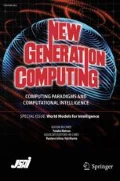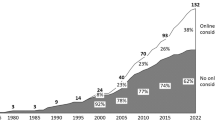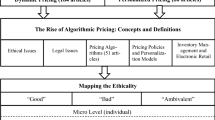Abstract
In an artificial market approach with multi-agent systems, the static equilibrium concept is often used in market systems to approximate continuous market auctions. However, differences between the static equilibrium concept and continuous auctions have not been discussed in the context of an artificial market study. In this paper, we construct an artificial market model with both of them, namely, the Itayose and Zaraba method, and show simple characteristic differences between these methods based on computer simulations. The result indicates the further need to model the market system by studying artificial markets.
Similar content being viewed by others
References
Arthur, W. B., Holland, J. H., LeBaron, B., Palmer, R. and Tayler, P., “Asset Pricing Under Endogenous Expectations in an Artificial Market,”Santa Fe Working Paper, 1996.
Tokyo Stock Exchange official web site, http://www.tse.or.jp/english/index.shtml
Izumi, K., “Does Learning by Market Participants Make Financial Markets Complicated?,” Papers from the AAAI Workshop Technical Report WS-02-10, Multi-Agent Modeling and Simulation of Economic Systems, pp. 11–15, 2002.
Harley, A. C.,Time Series Models, Phillip Allan Publishers.
X-Economy Project official home page, http://harmong.complex.eng.hokudai.ac.jp/x-econ/index.htm
X-SS web site, http://www.x-ss.org
Author information
Authors and Affiliations
Corresponding author
Additional information
Hidenori Kawamura, Ph.D.: He received Ph.D. degree from Division of Systems and Information Engineering, Graduate School of Engineering, Hokkaido University, Japan in 2000. He is currently an instructor in Graduate School of Information Science and Technology, Hokkaido University, Japan. His research interests include multiagent systems, mass user support, artificial intelligence, complex systems, and tourism informatics. He is a member of IPSJ, JSAI, IEICE, ORSJ, JSTI and AAAI.
Yasushi Okada, Ph.D.: He is a master course student in Graduate School of Engineering, Hokkaido University, Japan. He studies multiagent systems.
Azuma Ohuchi, Ph.D.: He received his Ph.D. degree in 1974 from Hokkaido University. He is currently the professor in Graduate School of Information Science and Technology, Hokkaido University Japan. His research interstes include systems information engineering, artificial intelligence, complex systems, tourism informatics and medical systems. He is a member of the IPSJ, JSAI, IEEJ, ORSJ, Soc. Contr. Eng., Jap. OR Soc., Soc. Med. Informatics, Hosp. Manag., JSTI and IEEE-SMC.
Koichi Kurumatani, Ph.D.: He received his Ph.D. Degree in 1989 from The University of Tokyo. He is currently a leader of Multiagent Research Team in Cyber Assist Research Center (CARC), National Institute of Advanced Industrial Science and Technology (AIST), Japan. His research interests include multiagent systems and mass user support. He is a member of JSAI, IPSJ, JSTI and AAAI.
About this article
Cite this article
Kawamura, H., Okada, Y., Ohuchi, A. et al. A study on effects of market systems in an artificial market. New Gener Comput 23, 23–32 (2005). https://doi.org/10.1007/BF03037647
Received:
Issue Date:
DOI: https://doi.org/10.1007/BF03037647




